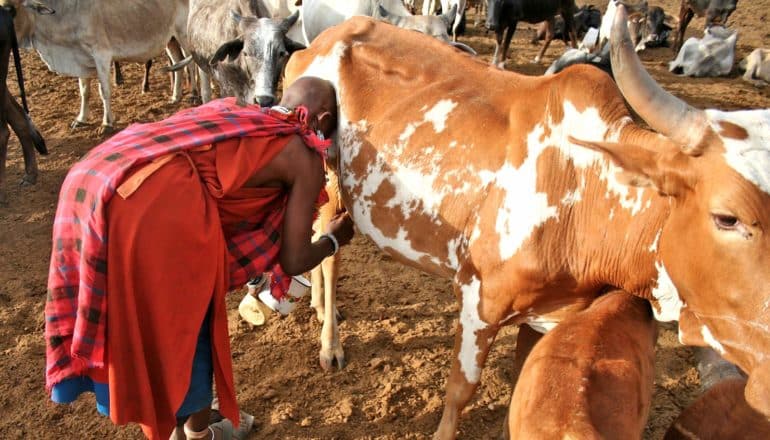
Milk was essential to east African herders at least 5,000 years ago, according to a new study about what’s now Kenya and Tanzania.
The work, published in the Proceedings of the National Academy of Sciences, also sheds light on human evolution.
After excavating pottery at sites throughout east Africa, researchers analyzed organic lipid residues left in the pottery and were able to see evidence of milk, meat, and plant processing.
“(This is) the first direct evidence we’ve ever had for milk or plant processing by ancient pastoralist societies in eastern Africa,” says Katherine M. Grillo, assistant professor of anthropology at the University of Florida.
“The milk traces in ancient pots confirms the story that bones have been telling us about how pastoralists lived in eastern Africa 5,000 to 3,000 years ago—an area still famous for cattle herding and the historic way of life of people such as Maasai and Turkana,” says coauthor Fiona Marshall, professor at Washington University in St. Louis, where Grillo earned her PhD.
“Most people don’t think about the fact that we are not really designed to drink milk as adults—most mammals can’t. People who had mutations that allowed them to digest fresh milk survived better, we think, among herders in Africa. But there’s a lot we don’t know about how, where, and when this happened,” says Marshall.
“It’s important because we still rely on our genetics to be able to drink fresh cow’s milk once we are adults.”
This research shows, for the first time, that herders who specialized in cattle—as opposed to hunting the abundant wildlife of the Mara Serengeti—were certainly drinking milk.
“One of the reasons pastoralism has been so successful around the world is that humans have developed lactase persistence—the ability to digest milk due to the presence of specific alleles,” Grillo says.
Notably, in east Africa there are distinctive genetic bases for lactase persistence that are different from other parts of the world. Geneticists believed that this ability to digest milk in northeast Africa evolved around 5,000 years ago, but archaeologists knew little about the archaeological contexts in which that evolution took place.
The development of pastoralism in Africa is unique as well, where herding societies developed in areas that often can’t support agriculture.
“Pastoralism is a very sustainable and viable means of life in these places,” Grillo says.
This practice continues into the present, with millions of people relying on herding in this part of the world. In fact, strong reliance on cattle, sheep, and goats in the past matches very well with what highly specialized herders do in east Africa today, Grillo says.
Source: Washington University in St. Louis, University of Florida
The post East African herders drank milk 5,000 years ago appeared first on Futurity.
from Futurity https://ift.tt/34KFtXp
No comments:
Post a Comment